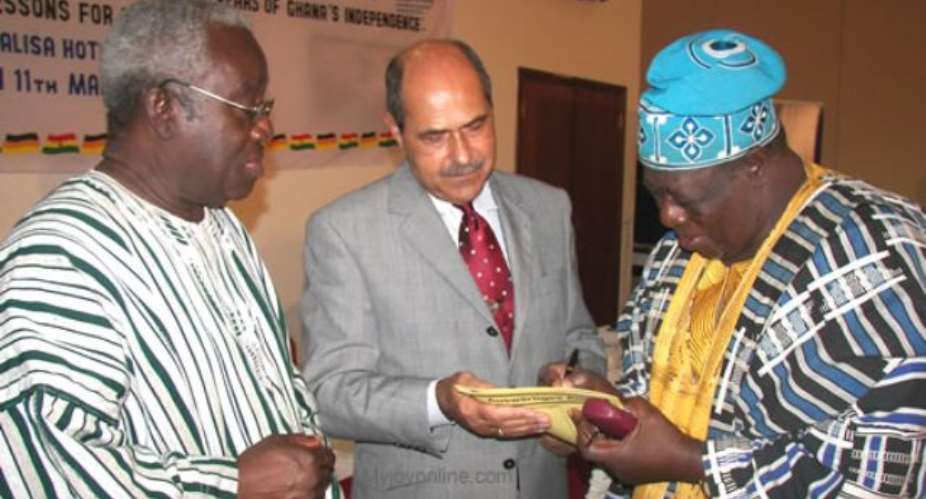The President of the National House of Chiefs, Naa Prof. John Nabila has commended President John Evans Atta Mills for declaring to continue programmes initiated by the Kufuor Administration, and said that is a positive step for Ghana's development.
Contributing to a symposium on 52 years of Ghana's Independence and 20 years of German Unification: Lessons for Nation Building, Naa Nabila said Ghana had come a long way in her development challenges, however a formidable distraction had been the tendency of succeeding governments to decimate programmes of their predecessors.
“We need to build on what is good, and it is heartwarming that the President has acknowledged there is no way we should throw the baby away with the bath water.”
Prof Mills has repeatedly pledged to continue good programmes he inherited from his predecessor government, and said Ghana has suffered enough from neglect of state projects.
The Forum was organized by the Konrad Adenauer Foundation in Accra, and saw three lead speakers take participants through the political histories of Ghana and Germany, with a general consensus that Ghana has a lot to learn from German experiences, given that the German people have managed a formidably unified nation in spite of their diverse orientations, backgrounds and experiences.
Prof. Kwesi Jonah, Senior Political Science Lecturer at the University of Ghana, advocated strongly that Ghana ought to adopt and practice the proportionate representation system of governance. In his view, the partisan presidential system, which he also described as the 'winner-takes-all', has divided the nation more than it has united it.
Speaking on Elections and Nation Building in Ghana's Fourth Republic; he said whereas elections have served as a melting point of all the issues the nation must discuss and find solutions to, it has served more to splinter the people.
He traced the history of Ghana's pre-Independence elections and said in 1951, 1954 and 1956, attempts at organizing elections yielded political groupings that appeared to give little room for uniting the nation. He said such groups were ethnic, religious or regional-based.
This he said, informed Dr. Kwame Nkrumah's agenda of building a unified nation through the instrumentality of the Convention People's Party, and so he disbanded all other political groupings and subsequently followed that with the Preventive Detention Act to deprive those groups of their leaders and ensure their effective disorganization.
Prof Jonah said while the one-party state failed to hold sway, a study of succeeding elections; unit committee, district assembly, parliamentary and presidential elections have also failed to deliver their promise.
He said the highest turnout recorded at Unit Committee elections has been 41 percent of eligible voters, explaining that both the electorate and candidates are not interested largely because of poor remuneration.
“Meanwhile this was supposed to be the unit closest to the people to engender unity,” he lamented.





 2024 election will be decided on the grounds of the economy; choice of running m...
2024 election will be decided on the grounds of the economy; choice of running m...
 Dumsor: We're demanding less; just give us a timetable — Kwesi Pratt to ECG
Dumsor: We're demanding less; just give us a timetable — Kwesi Pratt to ECG
 Do I have to apologise for doing my security work, I won’t – Simon Osei-Mensah r...
Do I have to apologise for doing my security work, I won’t – Simon Osei-Mensah r...
 Prestea and Bogoso mines: Complete payment of outstanding salaries not later tha...
Prestea and Bogoso mines: Complete payment of outstanding salaries not later tha...
 NDC postpones Prof. Opoku-Agyemang entry tour to May
NDC postpones Prof. Opoku-Agyemang entry tour to May
 All my businesses have collapsed under Akufo-Addo — NDC Central regional chair
All my businesses have collapsed under Akufo-Addo — NDC Central regional chair
 Military, Prison Officers clash in Bawku, three injured
Military, Prison Officers clash in Bawku, three injured
 GRA-SML contract: MFWA files RTI request demanding KPMG report
GRA-SML contract: MFWA files RTI request demanding KPMG report
 Court threatens to call second accused to testify if NDC's Ofosu Ampofo fails to...
Court threatens to call second accused to testify if NDC's Ofosu Ampofo fails to...
 Family accuses hospital of medical negligence, extortion in death of 17-year-old...
Family accuses hospital of medical negligence, extortion in death of 17-year-old...
